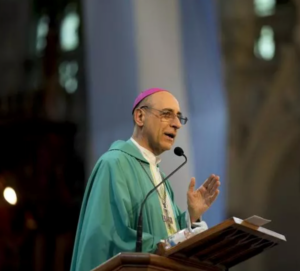
WelCom October 2023
The incoming Prefect of the Dicastery for the Doctrine of the Faith has warned that bishops – both progressive and those from traditionalist groups – who think they have a ‘special gift of the Holy Spirit to judge the doctrine of the Holy Father’ are on a road to ‘heresy’ and ‘schism’.
Speaking in response to a question on accepting Pope Francis’ magisterium, Cardinal Víctor Manuel Fernández said the Pope not only has a duty to guard and preserve the ‘static’ deposit of faith, but also a second, unique charism, only given to Peter and his successors, which is ‘a living and active gift’.
‘I do not have this charism, nor do you, nor does Cardinal [Raymond] Burke. Today only Pope Francis has it,’ said Cardinal Fernández, who took over from outgoing Spanish prefect Cardinal Luis Ladaria Ferrer in September and was elevated to cardinal at a consistory on 30 September. Cardinal Burke recently wrote the preface of a book that was sharply critical of the upcoming Synod on Synodality and has often expressed concerns about some teaching of this pontificate.
‘Now, if you tell me that some bishops have a special gift of the Holy Spirit to judge the doctrine of the Holy Father, we will enter into a vicious circle (where anyone can claim to have the true doctrine) and that would be heresy and schism,’ he said.
The Argentinian cardinal, who reportedly ghost-wrote Francis’ 2016 apostolic exhortation Amoris Laetitia and has contributed to several other major papal documents, addressed several concerns in an interview with the National Catholic Register, namely that pastoral practice is being separated from sound doctrine, the issue of ‘modernising’ the Church, and his stated openness to same-sex Church blessings.
He said he would not use the term ‘modernise’ to apply to the Church.
‘“Modernise” is a category more appropriate to corporations or other institutions; it does not apply to a supernatural reality such as the Church, which has eternal elements. Recent popes have used the word “reform” in the belief that there are aspects of the Church that can change, but always without renouncing a permanent humus (Latin for “soil” or “ground”) that goes beyond the passing of time, the different epochs and the superficial aspects of the world.’
Source: National Catholic Register